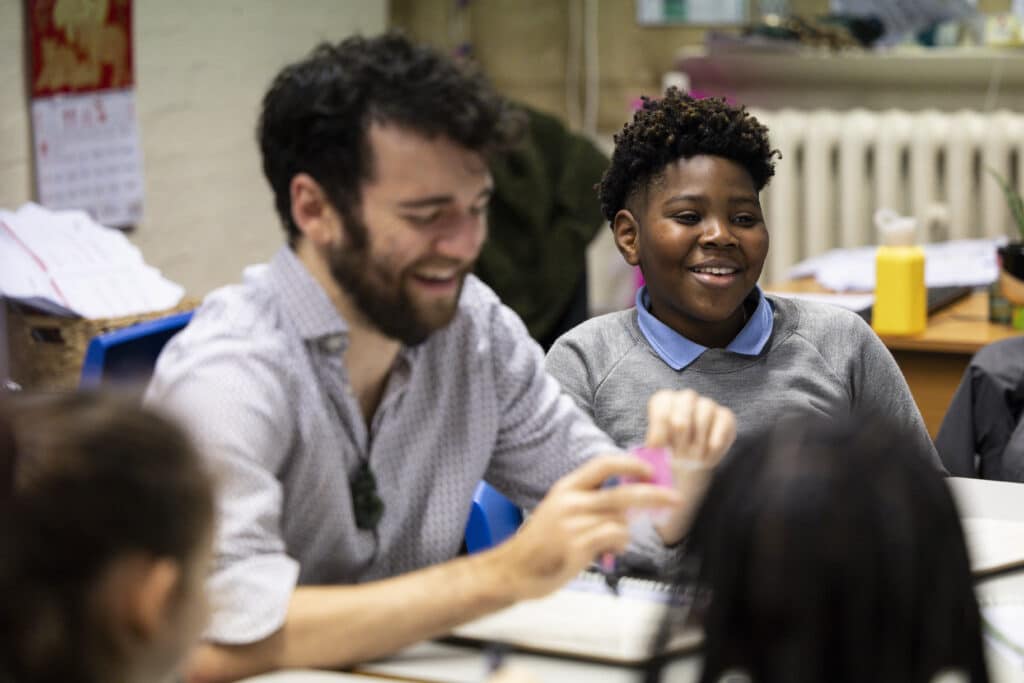Volunteering on a placement: five employability skills our student volunteers have learnt
Volunteering on a placement with Action Tutoring
Action Tutoring’s placement students actively support 1-3 young people across 10–20 weeks, building their maths or English subject knowledge, confidence and study skills. Volunteering on a placement, you can flex the number of programmes you volunteer on depending on the requirements of the module. And, additional responsibilities can be built in to ensure the full work experience objectives are met!
This Student Volunteering Week, we want to showcase five employability skills our 2022-23 placement students have learned so far…
1. Presenting topics in different ways to suit your audience
The pupils have taught me patience and creativity go hand in hand. If I can make their lessons interesting, with variation and by relating topics to them, then they will engage more with the subject material and benefit much better overall.
Cam, English Literature student at Newcastle University. Cam is volunteering with us as part of his Career Development Module
Action Tutoring provides tutors with workbooks and session plans, but you’ll still need your initiative and creativity! Tutoring hones skills in adapting your presentation style to suit different audiences.
These skills are transferable to any role in which you would need to present, pitch or explain an idea.
2. Empathy and understanding people from different backgrounds
Working with pupils from disadvantaged backgrounds has greatly improved my empathy. Throughout my time at school, I was fortunate enough to receive the necessary educational tools to allow me to thrive academically. Volunteering with Action Tutoring has opened my eyes to the attainment gap in schools across the country, and I have become increasingly aware of the academic struggles these pupils face.
Felix, Sports and Exercise student at the University of Exeter. Felix is volunteering with us as part of his Employability Module.
Experience working with people from different backgrounds is something many employers look for. They might ask you how you can relate to others, or for examples of how you’ve adapted your communication style in the past.
Working with children (particularly if you are tutoring pupils in a different area of the country!) is a great way of demonstrating this.
3. Patience, perseverance and motivation
Action Tutoring is a good way to improve your perseverance and patience skills, as every pupil is different and will often take a few sessions to feel comfortable around you.
Katie, Sociology student at Liverpool John Moore’s University. Katie is volunteering with us as part of her Sociology degree.
Perseverance is linked with motivation. Sometimes, your tutoring session might not run as smoothly as you’d like it to. A great way to demonstrate your motivated attitude is to explain how you overcame obstacles in your tutoring sessions.
Did you have to try three different ways of framing your explanation before you got that “lightbulb moment” with your pupil? Did you bring in a game to help them understand better the next time?
Tutoring experience can demonstrate that you are proactive and don’t allow challenges to keep you, or your pupil, from making progress.
4. Communication and confidence
The main thing that I have drawn from my pupils is communicating effectively. Before tutoring I felt that I had issues with my communication, regularly feeling anxious, however their desire to learn gave me confidence in my communication.
Madeline, English Literature student at the University of Liverpool. Madeline is volunteering with us as part of her Arts placement.
There are four fundamental skills involved in communicating effectively in any job: writing, speaking, listening and presenting. Tutoring can help you develop in all four areas.
Speaking also includes the use of body language, gestures and facial expressions effectively to aid communication. Tutoring is a great way to consciously practise these, as it can make you appear more approachable and help you connect with your pupils more. Read more tutoring tips!
5. Problem-solving
Developing my problem-solving and communication skills whilst teaching my tutees English has been both beneficial and seriously rewarding. The ability to actively engage tutee’s attention whilst providing a fun learning environment has been a skill and experience I wouldn’t usually use.
Tom, Human Geography student at Newcastle University. Tom is volunteering with us as part of his Career Development Module.
Employers value those who can problem-solve; it improves efficiency and increases the productivity of the organisation. When tutoring, you may need to use initiative and think outside the box.
How can you help your pupil understand how you got to the answer? How can you engage their attention if they’re distracted? Solving these small problems is key to an effective tutoring session.
More information on volunteer placements
You as an individual become more employable and in my case, a more fulfilled person too. It’s the best of both worlds!
Tom, Human Geography student at Newcastle University.
For more information on volunteering as a student, visit our student volunteering page.
Are you interested in completing your placement with us? Read our Placement Pack, or contact volunteer@actiontutoring.org.uk to be put in touch with our University Partnerships Coordinator.
Are you ready to hone your employability skills by volunteering for one hour per week?




